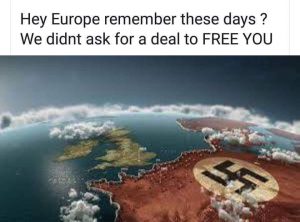Darkest Hour: Film Review

‘Darkest Hour’ offers us drama and tension aplenty, emotional highs and lows, and the usual cast of heroes and villains. In a welcome challenge to the ‘great leader’ myth, Churchill himself commits numerous tactical blunders, shows himself prone to wishful thinking, and is overcome by doubt and indecision — his own darkest hour. As the tension mounts, with Britain’s position seemingly hopeless and his critics ranged against him, his spirits reach their lowest ebb.
Diogenes
The year is 1940 and Britain is in dire straits. Abroad, the German army is sweeping across western Europe, a defeatist mentality paralyses the French top ranks, and the British army faces imminent annihilation at Dunkirk, probably to be followed by the invasion of Britain itself. At home, Churchill must negotiate a fragile coalition government, a divided Conservative Party, and rebellious and ambitious cabinet colleagues.
Darkest Hour, the 2017 film starring Gary Oldman that deals with Churchill’s first few weeks as prime minister in May 1940, inevitably resonates in this time of Brexit-related angst: the UK’s relationship with the European continent is currently under the microscope as never before in peacetime, with not a little hyperbolic talk about existential threats to our freedom and independence.
These tumultuous events of 1940 and Britain’s survival were, of course, exhaustively mined by Britain’s wartime propaganda machine, turning calamitous defeat and near-disaster into a form of national triumph. Ministry of Information shorts, such as Channel Incident (starring a young Peggy Ashcroft) and Neighbours Under Fire, trumpeted the indomitable will of the British people – the ‘Very Well, Alone’ mood of popular defiance also captured in David Low’s cartoons of the time and the ‘spirit of the Blitz’ in the face of the Luftwaffe’s aerial onslaught.
I have discussed elsewhere the issue of ‘fake history’ and film — questions of historical accuracy and fidelity to the facts, the portrayal of people and events from the past, and the inevitable trade-off between historical ‘truth’ and entertainment. What makes Darkest Hour compelling viewing — beyond undeniable echoes in our current political travails — is the knowledge that those wartime propaganda lines about defiance and British exceptionalism have now been resurrected and shamelessly peddled by cheerleaders in the diehard Brexit camp to support their views about the Brexit negotiations, the opportunities and threats posed by a no-deal outcome, and our current crop of political leaders.
Darkest Hour includes virtually no scenes of actual fighting, though the reality of Britain’s perilous strategic position casts its shadow across virtually every scene. The focus of the film is essentially Winston Churchill, hailed by many — especially on the right — as our national saviour. In 2002 (Golden Jubilee year, of course), he was proclaimed the greatest Briton in a BBC poll, and ‘he’ featured prominently in the opening ceremony of the London Olympics. To be fair, and perhaps in an indication of our changing national temper (or maybe just a reflection of the BBC2 audience), he lost out to Alan Turing and others in a 2019 BBC poll of the twentieth century’s greatest icon.
Churchill is arguably the most instantly recognisable figure from our past: the huge cigar, the V-for-Victory salute and the wobbly jowls delivering soaring oratory are etched into the popular consciousness. One effect of biographies and biopics (the good ones, anyway) is to flesh out and ‘humanize’ distant figures, uncovering something of the real person behind the myth. In Darkest Hour, we see glimpses of the husband and family man, the man of privilege baffled by the Tube map, the playful man giggling with the secretarial staff and (crucially) the man of doubt. His eccentricities and larger-than-life character are fully on display, dictating memos from his bed (and from the bathroom), consuming prodigious amounts of alcohol, berating his personal staff for the slightest of errors.
One cannot help but feel that aspects of Churchill’s personal conduct, long dismissed — perhaps even applauded — as quirky, eccentric and idiosyncratic, would in today’s #MeToo climate be condemned as unacceptable bullying and sexist behaviour. Films about personalities and events from the past nevertheless reflect the mood, norms and expectations of the times in which they were made. With diversity and inclusion society’s current watchwords, any film about events dominated almost exclusively by socially privileged white men will throw up interesting challenges for director and scriptwriter.
In the film, a key role is therefore assigned to a woman, Elizabeth Layton. Though a lowly secretary, the script manoeuvres her close to the action and the locus of power, often involving her in intimate, one-to-one situations with Churchill (intimate in the sense that both can reveal hidden worries and doubts). Her role is as a proxy, a personification of the British public at large, their hopes and fears, their questions and concerns. She is fearful but resilient, curious to know more, and able to handle the unpleasant, unvarnished truth. Meanwhile, Churchill’s wife, Clemmie, is the steadying influence behind the scenes. More than just the dutiful wife, she gently admonishes the great man when he behaves like an ass.
Darkest Hour offers us drama and tension aplenty, emotional highs and lows, and the usual cast of heroes and villains (with, in this case, Neville Chamberlain perhaps somewhere in the middle). In a welcome challenge to the ‘great leader’ myth, Churchill himself commits numerous tactical blunders, shows himself prone to wishful thinking, and is overcome by doubt and indecision — his own darkest hour. As the tension mounts, with Britain’s position seemingly hopeless and his critics ranged against him, his spirits reach their lowest ebb. He becomes forgetful and — the ultimate catastrophe for a politician feted for his ability to communicate — struggles to find the words, before rediscovering his mojo with the help of the great British public in the controversial ‘Underground’ scene — controversial in the sense that it is purely fictional.
The George VI presented to us is also of interest. Though the icy relationship between Churchill and the king thaws somewhat as the film progresses, the viewer will struggle to reconcile this monarch with Colin Firth’s portrayal in The King’s Speech. In the latter, he is warm, vulnerable and all-too-human. Here, he is remote, cold, bigoted and snobbish. The scene where he surreptitiously wipes his hand behind his back after it has been kissed by Churchill is particularly telling. Later, in an ironic turn, it is the king who urges the prime minister to listen to the voice of the people, precipitating Churchill’s journey of rediscovery on the Underground.
The role of arch-baddie is, however, reserved for Lord Halifax, the king’s confidant and political puppet-master, pulling Chamberlain’s strings in a bid to engineer a compromise peace with Hitler, thus preventing a German invasion and safeguarding the British Empire. He is calculating and scheming, refusing to take on the role of prime minister after Chamberlain’s resignation as the time is ‘not yet right’. The England (sic) he cherishes and seeks to preserve is that of the upper-class gentleman and country estate, a land of strict social division, of privilege and entitlement. Compare this with the portrayal of the ordinary Englishman and Englishwoman: patriotic, decent and resolute.
Films recreating events from the past must find imaginative ways to contextualise events, plugging gaps in the viewer’s historical knowledge and ensuring that the storyline makes sense. Here, for example, Churchill explains to someone who would have known the situation perfectly well that the king disliked him because he (Churchill) supported his (George’s) brother’s desire to marry Wallis Simpson. To establish the reasons for Churchill’s unpopularity with many Tories, we are offered a montage of politicians in whispered discussion, each with a gripe against Churchill: it is a ‘greatest hits’ of his errors and failings — serial infidelity to the Conservative Party, Gallipoli, India and the return to the Gold Standard.
The scenes in the Chamber of the House of Commons are pure theatre — the bear-pit atmosphere and the dramatic lighting, as if a solitary spotlight were picking out the speaker at the despatch box, with the surrounding benches (front and back) almost in darkness, the more so to accentuate order papers furiously batting the air.
The debates themselves do not (inevitably) ring particularly true. For example, the two-day debate that led to Chamberlain’s resignation is here shortened to about five minutes. Labour’s Clement Attlee is forensic and withering, far too much so, if the recent biography by John Bew is to be trusted. Crucially, the damning verdict of backbench Conservative MP Leo Amery, invoking Cromwell to the Rump Parliament — “In the name of God, go!” — is expunged from the record, as it wouldn’t serve the narrative, namely that Churchill did not have the Tory backbenches behind him and that his support came from the Labour benches. To the end, Chamberlain appears to command the loyalty of the Conservative MPs, a surreptitious wave of the handkerchief his signal to the backbench troops whether or not to show their support for the new prime minister.
Some of the points made in this article were also made in the article ‘Fake History’ and Film.



Thank god for this imperfect man.we .aye all be speaking German now!.
Saved european civilisation.